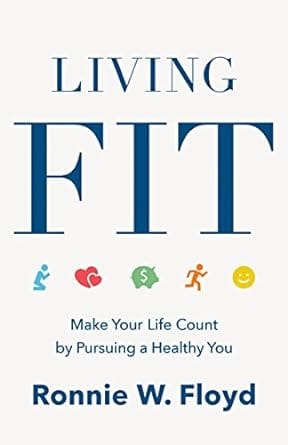
Living Fit: Make Your Life Count by Pursuing a Healthy You
 Excerpt from Living Fit: Make Your Life Count by Pursuing a Healthy You by Ronnie W. Floyd
Excerpt from Living Fit: Make Your Life Count by Pursuing a Healthy You by Ronnie W. Floyd
Chapter 14
Live Responsibly
Regardless of where we find ourselves financially, we need to live responsibly. Whatever our level of assets, we need to manage and use them responsibly.
Being irresponsible financially will place your family on a rapid descent from any level of success you may be experiencing today. While your intention will never be to lose money, assets, and resources, irresponsibility in decision making will jeopardize any stability you may be enjoying today.
Financial problems create enormous pressure in life. Not only will they impair your vision, they will affect you relationally and emotionally. Nothing will choke the joy out of your life more than financial pressures and worries.
This chapter is a call to live responsibly. This means that you are answerable. This means that you understand you will give an account to someone else for your life and the decisions you make. On the contrary, irresponsibility means that you believe you are not answerable for your actions. Living responsibly is healthy, while living irresponsibly is unhealthy.
On this pursuit of a healthy you, a compelling call is coming forth. Pertaining to money, assets, and resources, wisdom is calling you to a renewed commitment to live responsibly. When money, assets, and resources are involved, the stakes are high. Therefore, live responsibly.
The Driving Force of Living Responsibly
For those of us who believe in the Bible and what it says, we realize the cherished place of theology. Theology is the study of God. Breaking down the word theology leads us to understand that not only is theology the study of God, but it is also words about God. From these words about God and the study of God, we get our view of life and the entire world.
Theology touches every part of life. This includes money, assets, and resources. What God says about these things within the bigger context of all He says in His Word shapes our lives greatly.
Our theology of stewardship should be driven by one major theological doctrine. I believe this is the doctrine of God, what scholars call “Theology Proper.” Think about where the Bible began. Genesis 1:1 says, “In the beginning God created the heavens and the earth.” God is the Creator of all people and things. Therefore, He owns everything. Another declaration that affirms this is made in Psalm 24:1. It says, “The earth and everything in it, the world and all its inhabitants, belong to the Lord.” When God created all things and did so out of nothing, He did what no one else can do and what no one else will ever be able to do. Why? He is God. God owns everything.
This doctrine of God is also expounded in Psalm 50:12, which says, “If I were hungry, I would not tell you, for the world and everything in it is mine.” God declares boldly, “The world and everything in it is mine.” Yes, God owns everything. Haggai 2:8 says, “‘The silver and gold belong to me’—this is the declaration of the Lord of Armies.” God owns everything. At the risk of being redundant, let me state again: God is the Creator and Owner of all things.
But this gets even greater and more personal. Genesis 1:26 says, “Then God said, ‘Let us make man in our image, according to our likeness. They will rule the fish of the sea, the birds of the sky, the livestock, the whole earth.’” After God created man He gave him the authority to rule over all creation.
The word rule is very important in this text. It comes from the Hebrew word radah, which means “I rule.” It is used twenty-two times in the Old Testament and is always limited to human dominion. In other words, God has entrusted to man the task of ruling over all of His creation.
This is furthered in the New Testament. Luke 16:2 says, “So he called the manager in and asked, ‘What is this I hear about you? Give an account of your management, because you can no longer be my manager.’” The word management is the Greek word oikonomos, which means “to be a manager of an estate or an inspector of goods.”1 Management is also translated “stewardship.” Therefore, while God owns everything, we are called to manage it for Him responsibly.
Living responsibly is living in accountability to God for your life and how you are managing all that He entrusts to you. Each of us is responsible and accountable to God in our management or stewardship.
The driving force of living responsibly is the doctrine of God. God does not have to consult with anyone about anything. He is God. He is over all, in all, and through all. He is sovereign in and over everything.
Never forget that God owns everything, because He created everything. We have been given the task of watching over His creation. We are accountable to God for our management, or if you prefer, our stewardship in life.
Three Important Convictions for Living Responsibly
Driven by a deep and rich doctrine of God, I want to give you three important convictions you should have in order to live responsibly. Relating to money, assets, and resources, these three things, when acted upon by anyone, will either ascend your life or sink it in a speedy descent. These things flow from the deep convictions already shared in this chapter.
- God is the owner of everything.
God has no needs. He owns everything. God is sovereign over everything. Personally, my doctrine of God is that He is all, owns all, knows all, and demands all. The more I believe this, the more it will impact my life daily and my decision-making about everything.
- You are a manager and temporary keeper of everything.
As King David declared in 1 Chronicles 29:16, “Lord our God, all this wealth that we’ve provided for building you a house for your holy name comes from your hand; everything belongs to you.” Even the wealthy King David knew and practiced a deep belief that God owned everything, and anything he gave to God’s house and people was really a gift back to God.
If God has entrusted you with money, assets, and resources, then He has given you the power, by His Spirit, to steward it wisely. Every talent and gift, as well as all treasures, are given to us to manage temporarily. Faithfulness to God and His Word is living responsibly.
This leads to a profound insight and a stirring challenge in life: God owns everything and you own absolutely nothing. While I stated this truth previously, by now you should know why I believe it so passionately. I am convinced this is foundational to the way you manage and expend all the money, assets, and resources God has entrusted to you. We must be both faithful and responsible in every way. This is what a manager and steward does.
- You are accountable to God.
Each of us is accountable to God daily. In the Garden of Eden, Adam and Eve failed in their stewardship. God told them specific things He wanted from them, but they chose to disobey. Immediately, they became accountable for their stewardship.
Living responsibly in our management and stewardship occurs in a greater way when we know that we are accountable to God. The moment we believe it is ours will be the moment we enter into the sin that happened in Eden—disobedience to God.
No one can hide or run away from Romans 14:12. It says, “So then, each of us will give an account of himself to God.” These words are inescapable. We cannot run and try to hide like Adam and Eve did in the Garden of Eden. God found them. God will find us.
He will hold us accountable for everything, including the way we manage all the money, assets, and resources He has entrusted to us.
Knowing this should impact our decision-making greatly. Our deep respect for God demands our best.
Seven Suggestions That Will Help You Live Responsibly in Your Everyday Choices
Knowing the right things to believe and do is one thing, but choosing to live them out daily takes it to a whole new level. Our everyday choices show how committed we are to living like God wants us to live. Whether these choices seem small or big, insignificant or significant, each is important to God and represents what we believe about who He is. God wants us to manage properly everything He has entrusted to us.
Therefore, in closing this chapter, I want to do what I can to help you live responsibly through your everyday choices relating to money, assets, and resources. Here is a list of seven suggestions that will help you live responsibly through your everyday choices.
- Learn everything you can about what God says about money.
Ignorance in today’s world about money, assets, and resources is unacceptable. Educate yourself in God’s Word and God’s ways about money. Money is not the end, but a means to an end. Money is a tool God has entrusted to you. Learn everything you can about the purpose of money: giving money, saving money, and spending money.
- Develop a financial plan.
Whether your total resources are minimal or plentiful, develop a financial plan for your future. When you plan for failure, the outcome will soon follow. When you refuse to think about practical matters like monthly expenses, healthcare, life insurance, and retirement, you are living irresponsibly. You cannot declare that God will take care of you when you live without financial diligence.
- Continually adjust your attitude.
Continually adjusting your attitude is very important. Otherwise you will slip into thinking “It’s my money!”, and you will arrogantly live this belief out. This is an unbiblical and improper view of money. It is not your money. It is God’s money. Therefore, do not fall into this practice. Believing it is your money will lead to pain. You will reap what you sow. Continually adjust your attitude. Refuse to fall into the use of this verbiage and false belief about yourself. Remember, God owns everything and you own absolutely nothing.
- Live on cash, not credit cards.
A credit mentality is a destructive mentality. If you play now, thinking credit is yours, you will pay later horribly and miserably. You are not financially healthy if you are living on credit. Sooner or later you will have to pay for it. The cost can be high and very painful.
Credit card debt is the worst kind of debt. If you use a credit card, pay it off at the end of the month, every month. Many financial leaders and teachers like Dave Ramsey would say to cut up your credit cards and throw them in the trash.
- Eliminate debt.
Strong warnings exist in Scripture relating to debt. Proverbs 6 tells us if we are trapped in debt, we need to do all we can to see ourselves freed from it. We do this through working and paying the price to be free financially. Walking in humility, we take every financial decision we make seriously and live it out responsibly. Get out of the trap of debt as fast as possible.
It is much easier to get into debt than to get out of debt. Many will help you to get into it, but getting out of it is up to you. Do all you can to eliminate debt. Freedom awaits.
- Avoid impulsive spending.
There is always a sale. Do not be deceived. Live responsibly. Every time we shop in person or online, our lust button for something flips on. This becomes problematic because what we want, we want now. Impulsive spending can lead to disaster.
At times, one of the wisest things you can do is to delay your decision. Wait for a few days or a week. You may find that you can live without it or you may even forget about it. The human eyes are powerful. Once they lock onto something, it is hard to walk away from it. Refuse to practice impulsive spending.
- Refuse get-rich-quick schemes.
There is no such thing as getting rich quickly. Refuse to buy into this mentality. Nothing comes without a price. Proverbs 21:5 is a strong encouragement but also a stern warning. It says, “The plans of the diligent certainly lead to profit, but anyone who is reckless certainly becomes poor.” We are encouraged that wise and responsible planning will lead us to profit. But we are also warned that recklessness in handling our finances will lead to poverty. Refuse to risk it all by following a sales pitch to get rich quick. There is no such thing.
I hope you will follow the suggestions I have given to you to help you live responsibly through your everyday choices.
The Only Thing Money Can Do for You
Years ago while attending a conference, I heard leadership guru and bestselling author John Maxwell say something along the lines of: The only thing money can do for you is give you more options. This was highly impactful in my life.
You see, the less money you have, the fewer options you have. The more money you have, the more options you have.
When we live responsibly, we will have more options before us. When we do not live responsibly, our future becomes limited.
Therefore, hear the heart and feel the passion emerging from the pages of this chapter. Live responsibly.
Trending Now
Sign up today for your Inspiration Today Daily Newsletter
Supercharge your faith and ignite your spirit. Find hope in God’s word. Receive your Inspiration Today newsletter now!
Ronnie Floyd
Ronnie Floyd is senior pastor of Cross Church in Northwest Arkansas, a multi-site fellowship of believers. Ronnie is the author of more than twenty books. His articles on life and leadership can be read several times a week on ronniefloyd.com
Related Articles
January 29, 2026
5 Traits of Good Leadership
The traits of good leadership aren’t just about results—they’re about relationships. Servant…
December 9, 2025
End-of-Year Giving Benefits: Tax Savings, Legacy Gifts & Stewardship
As the year draws to a close, many believers take time to reflect on God’s goodness, their personal…
November 29, 2025
What Does the Bible Say About Finances?
Learn what the Bible teaches about money, giving, and contentment. Explore 10 scriptural principles…
November 20, 2025
Can You Smile at Your Future?
When you make the Lord your dwelling place amid life’s storms, you can rest confidently in His…
Next Steps To Strengthen Your Walk
Inspiration Today Newsletter
Supercharge your faith and ignite your spirit. Find hope in God’s word. Receive your Inspiration Today newsletter now!
Christian Articles
Find articles to strengthen your walk and grow your faith. We have a wide range of topics and authors for you.
Submit A Prayer Request
We are here for you. Simply click on the button below to reach us by form, email or phone. Together we will lift our hearts and voices with you in prayer.





